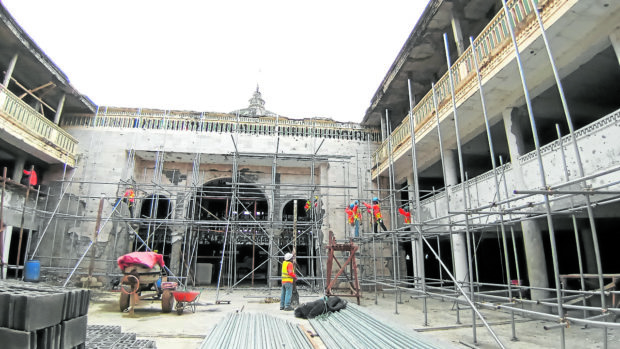
FULL BLAST The reconstruction of Dansalan Bato Ali Mosque in Marawi City has been in full blast since late last year. The religious site was heavily damaged during the 2017 siege. —DIVINA M. SUSON
KORONADAL CITY, South Cotabato, Philippines — A task force overseeing the reconstruction of war-torn Marawi City has expressed confidence in completing its mission by the end of this year despite delays due to the coronavirus pandemic.
Housing Assistant Secretary Felix Castro Jr., field manager of Task Force Bangon Marawi (TFBM), said at least P22.393 billion had been released so far for various public works projects and P5 billion more was expected this year.
Marawi was devastated more than three years ago when government troops and Islamic State (IS)-linked militants fought for five months, displacing up to 350,000 residents in 24 villages.
Several hundred families still live in transitory shelters built by the government on the outskirts of the city, while thousands have temporarily settled in other parts of northern Mindanao and Metro Manila.
Ongoing rehabilitation projects include the reconstruction of Grand Padian Market, barangay halls, museum, fire station and the city’s School of Living Tradition, road reconstruction, electrification and the installation of a water system, Castro said. Rebuilding of several mosques has also begun, he said.
Health crisis
Castro said the pandemic disrupted the reconstruction work as workers went home at the onset of the public health emergency in March last year. Government agencies and nonprofits either stopped their work or shifted attention to respond to the health crisis. Work on the projects slowly returned from May to June and went full blast by July last year, Castro said.
“We believe we can make up for the lost time. The contractors were instructed to double their efforts so we can meet the target date of completion,” he told an online forum hosted by Mindanao Institute of Journalism and Internews.
If the Dec. 31, 2021, target could not be achieved, Castro said the task force was making sure it would complete the rehabilitation “before the Duterte administration bows out from power on June 30, 2022.”
President Duterte wants to finish the reconstruction of Marawi on or before his term ends, he added.
Rebuilding mosques, roads
Housing Secretary Eduardo del Rosario, TFBM chair, is conducting a monthly monitoring visit in Marawi to ensure that contractors were keeping the desired pace.
Citing a report from TFBM, Sen. Risa Hontiveros noted that as of last November, only 30 percent of the reconstruction plan was accomplished.
A total of 46,129 households in Marawi have been profiled by the government so it could help them get back on their feet. Of these, Castro said 28,388 households outside the so-called most affected area (MAA), or ground zero of the siege, had been allowed to return home in 2018 through the Kambalingan initiative of the local government and national government agencies under TFBM.
At least 17,791 households within MAA have yet to go home, he added.
Almost 3,000 families are occupying transitional shelters built by the government. A little over 4,000 shelters have yet to be put up, Castro said.
Some 4,000 permanent housing units are being built for the displaced families, 3,000 of which were funded by the national government and 1,000 by the Bangsamoro Autonomous Region in Muslim Mindanao, he said. INQ